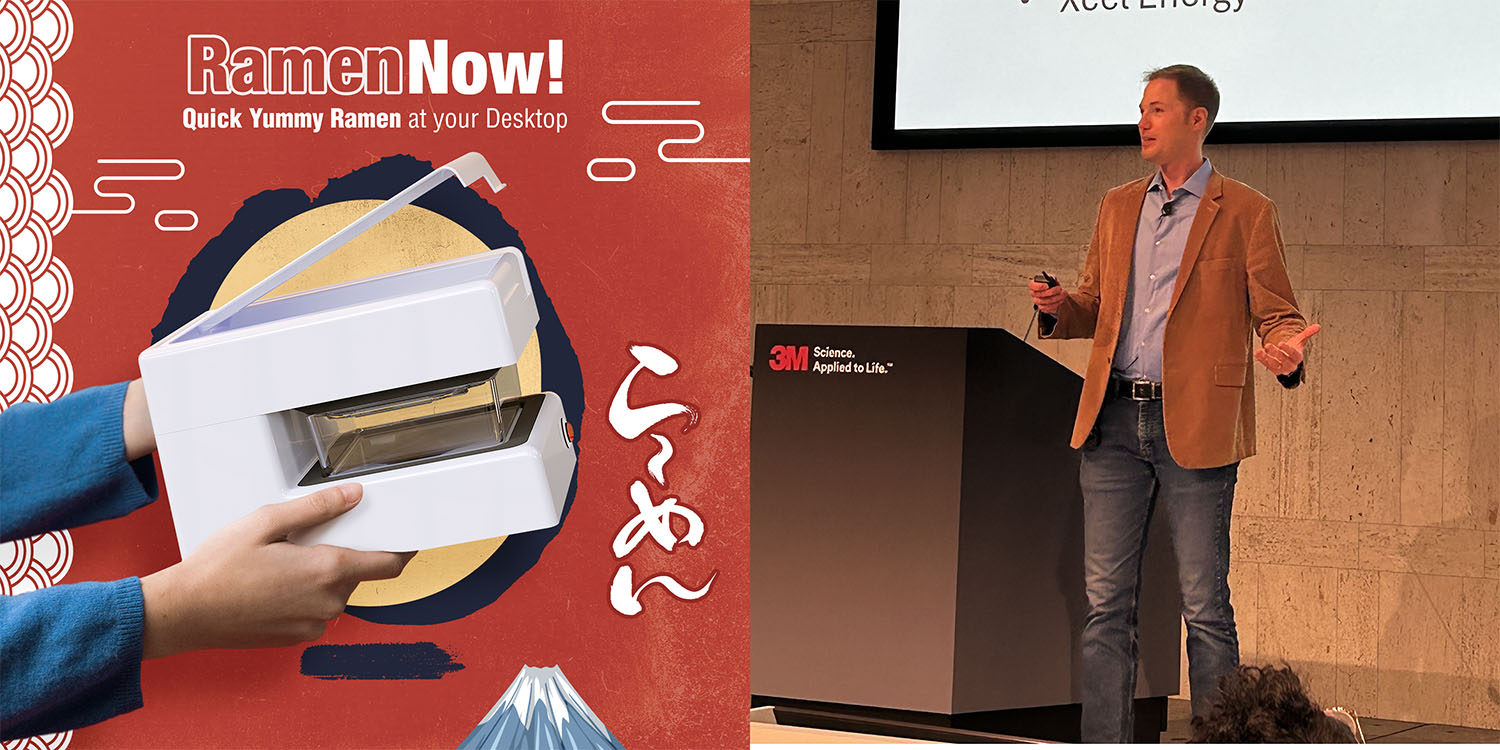GW Engineering alumnus Travis Thul, D.Eng ‘18, discusses the process behind his invention of the world’s first desktop ramen noodle cooker. From serving in the US Coast Guard to finding an angel investor to help bring his product to market, Travis shares a wild journey made possible by his time at GW.
'While at GW, I gained the skills and knowledge I needed to pursue my goals. I learned about IP generation, risk management, managing e-Commerce, and more. Those topics were invaluable to getting our product to where it is now.'
Travis Thul
D.Eng ‘18
Where did you grow up and how has your background influenced you today?
I grew up in rural Wisconsin, two hours from St. Paul, Minnesota. Like many boys, I looked up to my father and grandfather who seemed to always be fixing something (or attempting to do so). There was no shortage of finding ways to put things together to solve problems. I believe it was this combination of ingenuity, necessity, and creativity which sparked my career path in engineering and inventing.
Did you receive a scholarship at GW? How did your scholarship help you succeed?
I was able to pursue my Doctor of Engineering using the GI Bill. Without that support, there is no way I could've made it through such a rigorous and time consuming curriculum while also working and raising a family.
While at GW, I gained the skills and knowledge I needed to pursue my goals. I learned about IP generation, risk management, managing e-Commerce, and more. Those topics were invaluable to getting our product to where it is now.
Can you share a bit more about the origin story of your product?
Our team conceived the product while serving in the US Coast Guard. Like many young officers, I typically kept a stash of ramen noodles and other snacks at my desk. As fate would have it, a day after battling food poisoning from eating at the base mess hall, I was scheduled to perform a 24-hour duty watch. During the night watch, after determining I did not want to risk another bout of illness, I reviewed my inventory and decided that I'd break open the pack of ramen.
Unfortunately, after inspecting the base kitchenette, it became clear there was no pot, a questionable stove, no dishes, and a microwave that looked like a spaghetti bomb had exploded and dried over the preceding week. After considering my options, I did notice the coffee maker appeared to be clean and operable. That said, it clearly did not meet the form, fit, or function of cooking noodles. After noodling it a bit, and thinking of the success of the Keurig, I wondered if anybody had developed a Keurig type device for ramen. After untold searches–giving way to prototyping–it became clear there was an opportunity for us ramen eaters to eat our ramen more conveniently along with other dehydrated foods like instant oatmeal, miso soup, and mac and cheese.
Tell us about your current professional role and how it excites you.
After completing my degree, I leveraged the knowledge gained in the program to double down on my pursuit of intellectual property and building a startup. This resulted in pushing forward a company built around a novel small kitchen appliance - the world's first desktop ramen noodle cooker (The Ramen Now!).
Our unique origin story, combined with strong patents, product novelty, and a wild journey of success (and failure) led to coverage on Freakonomics Radio. That interview led to an angel investor reaching out and helping us secure funding to bring the product to market. The Ramen Now!, currently being developed in partnership with the same manufacturer behind Shark-Ninja products, is taking preorders and should be on store shelves in the next 12 months!
What accomplishment are you most proud of personally or professionally and why?
Beyond my wife and children (who will always take first place), I am elated with the prospect of bringing a novel product to market and serving an international audience. Securing investor funding and visibility through Freakonomics Radio is a cherry on the cake. That said, I cannot discount my military service, work in higher education, or my time in the White House, but those are different stories.
What is your only-at-GW moment? In other words, what is an experience/opportunity you believe GW provided you access to?
GW's School of Engineering & Applied Science is unique in some of its doctoral offerings. Unlike many universities, SEAS leans into helping develop engineering managers and systems engineers who are already established professionals. The students I worked with were bringing with them experience from already bright careers and perspectives from employment across the world. This gave all of us the opportunity to learn as much from each other as we did from the faculty.
What is a fun fact about you that you'd like to share?
I don't know that it gets much more fun than being the inventor of the desktop ramen noodle cooker!
Was there a standout course, professor, or organization from your time as a student that inspired your career path?
Risk Analysis with Professor Thomas Holzer! While he has since passed on, my time working with him will always be extremely memorable. You know you’re talented when you can find a way to make underappreciated components of engineering management not only interesting, but memorable. I remember working with him to do a whole risk management plan for Jurassic Park. While seemingly obtuse, using such a complex and nuanced system as a foundation for planning for risk presented so much opportunity to dig into what can go wrong and how to plan for it. It was pretty cool.
What is a piece of advice you would offer to students seeking to pursue your field of work?
Don't stop. Ever.
How do you give back to the GW community?
I am a non-stop advocate for SEAS and preach its accessibility and quality to all who will hear it.


